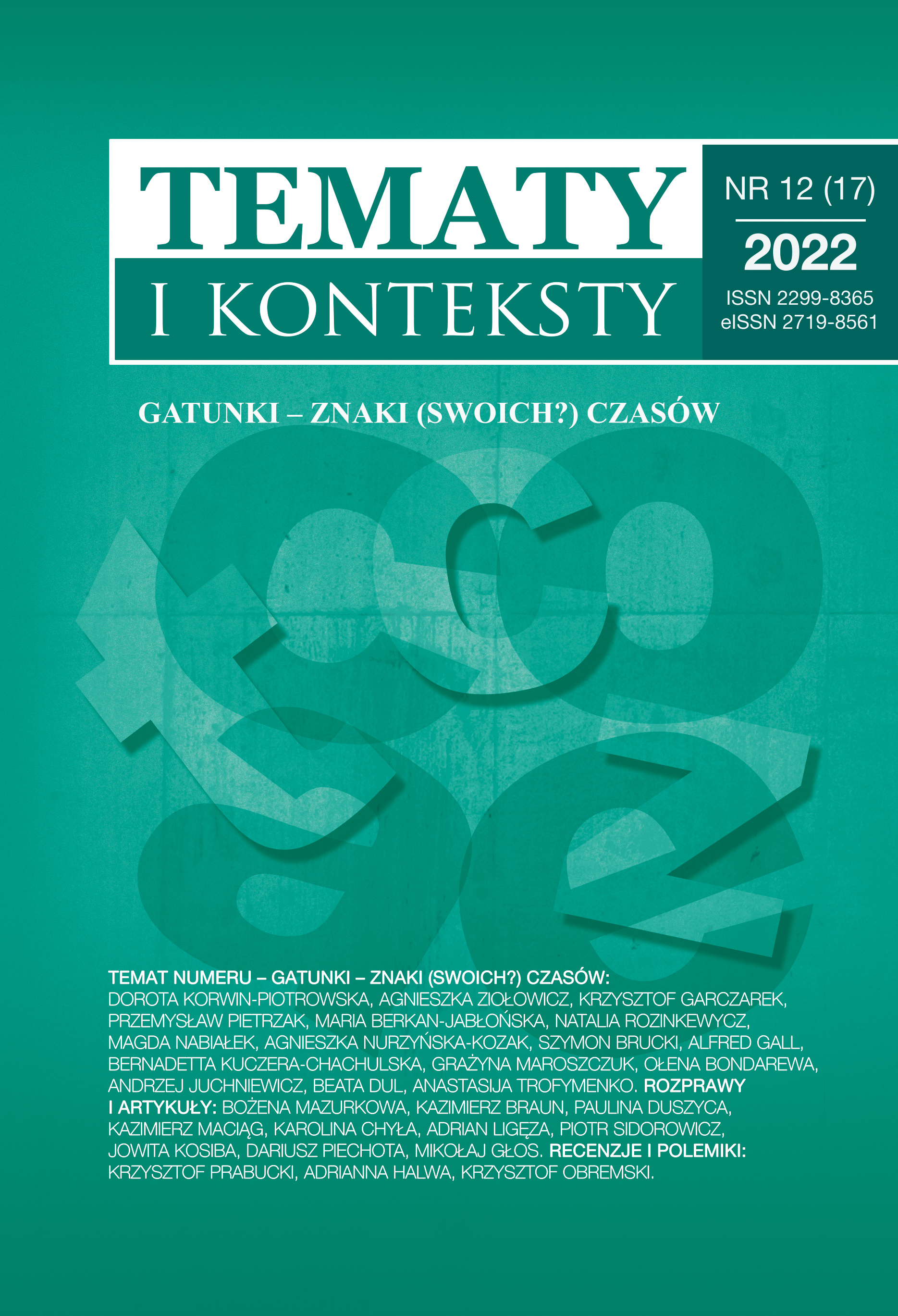Why Animals? A "Poem about an Urban Slaughterhouse" as a Zocritic Narrative
DOI:
https://doi.org/10.15584/tik.2022.14Keywords:
Tadeusz Śliwiak, ecology, post-anthropocentrism, violence against animals, memory scarsAbstract
The article's author proposes a zoocritical reading of Tadeusz Śliwiak's Poem about the Urban Slaughterhouse and poems from other volumes in which animals appear. The basic assumption is an attempt to notice in the volume from 1965 threads testifying ecological sensitivity, which anticipated the subsequent development of ecological literature. The author, taking into account the poems created since the 60s of the twentieth century, postulates the recognition of Śliwiak as a poet who shows a tendency to include not only people but also animals in the "community of the wounded". The emotion that allows us to build a new order based on care and responsibility is the humiliation experienced by the poet during his stay in the city slaughterhouse during the Second World War. What testifies to the persistent return of memories from that period is the metaphor of the "scar of memory", appearing in many poems. The author of the article argues that long-term observation of the mass death of animals could have been a traumatic experience for the poet.
Downloads
References
Baratay É., Zwierzęcy punkt widzenia. Inna wersja historii, przeł. P. Tarasewicz, Gdańsk 2014.
Barcz A., Realizm ekologiczny. Od ekokrytyki do zookrytyki w literaturze polskiej, Katowice 2016.
Bekoff M., Manifest zwierząt. Sześć powodów, żeby okazywać więcej współczucia, przeł. A. Pluszka, Warszawa 2019.
Derrida J., Widma Marksa. Stan długu, praca żałoby i nowa Międzynarodówka, przeł. T. Załuski, Warszawa 2016.
Filipowicz A., (Prze)zwierzęcenia. Poetyckie drogi do postantropocentryzmu, Gdańsk 2017.
Jarzyna A, Pismo wyobraźni w poezji Bolesława Leśmiana, Józefa Czechowicza, Krzysztofa Kamila Baczyńskiego, Tadeusza Nowaka, Łódź–Kraków 2017.
Jarzyna A., Post-koiné. Studia o nieantropocentrycznych językach (poetyckich), Łódź 2019.
Kaliszewski A., Daleko od Montmartre’u (o poezji Tadeusza Śliwiaka), w: tegoż, Wieczna gra. Artykuły i szkice, Kraków 2009.
Kisiel M., Lwów: dom pusty, „Śląsk” 2000, nr 12, s. 49.
Kisiel M., „Utracone” i „odzyskane”. O dwóch wierszach Floriana Śmiei, w: tegoż, Między wierszami. Jedenaście miniatur krytycznych, Katowice 2015.
Krupiński P., Co się śni zwierzętom? Eseje z pogranicza zoofilologii i psychoanalizy, Warszawa 2021.
Mance H., Jak kochać zwierzęta w świecie człowieka, przeł. N. Radomski, Poznań 2022.
Margalit A., Emocje przypomniane, przeł. T. Kunz, w: Historie afektywne i polityki pamięci, red. E. Wichrowska, A. Szczepan-Wojnarska, R. Sendyka, R. Nycz, Warszawa 2015.
Niesporek K., Dom. O jednym wierszu Tadeusza Śliwiaka, w: Zemsta ręki śmiertelnej. Interpretacje wierszy poetów XX wieku, Kraków 2017.
Niesporek K., Zagłada zwierząt i ludzi. Lektura „Poematu o miejskiej rzeźni” Tadeusza Śliwiaka, „Porównania” 2021, nr 2, s. 167–187.
Pieszczachowicz J., Między naturą a historią, w: T. Śliwiak, Poezje wybrane, wstęp i wybór Autora, posłowie J. Pieszczachowicz, Warszawa 1988.
Pieszczachowicz J., Pegaz na rozdrożu. Szkice o poezji współczesnej, Łódź 1991.
Sandauer A., Poezja tragicznego ładu (Rzecz o Tadeuszu Śliwiaku), w: tegoż, Zebrane pisma krytyczne. Studia o literaturze współczesnej, Warszawa 1981.
Sobolczyk P., „Ty jesteś krowa a ja Żyd”. Tadeusza Śliwiaka Holocaust zwierząt, „Pogranicza” 2009, nr 5, s. 28–40.
Stabro S., Tadeusz Śliwiak – powrót poety, „Hybrydy” 2015, nr 26, s. 53–57.
Stankowska A., Kształt wyobraźni. Z dziejów sporu o „wizję” i „równanie”. Kraków 1998.
Śliwiak T., Co dzień umiera jeden bóg, Kraków 1959.
Śliwiak T., Wyspa galerników, Kraków 1962.
Śliwiak T., Poemat o miejskiej rzeźni, Kraków 1965.
Śliwiak T., Czytanie mrowiska, Warszawa 1969.
Śliwiak T., Ruchoma przystań, Kraków 1971.
Śliwiak T., Znaki wyobraźni, Kraków 1974.
Śliwiak T., Wiersze wybrane, Warszawa 1975.
Śliwiak T., Wstęp [w:] tegoż, Poezje wybrane, wybór i wstęp T. Śliwiak, Warszawa 1975.
Śliwiak T., Odmroczenia, Kraków 1982.
Śliwiak T., Od autora, w: T. Śliwiak, Poezje wybrane, wstęp i wybór Autora, posłowie J. Pieszczachowicz, Warszawa 1988.
Śliwiak T., Poezje wybrane, Warszawa 1988.
Ubertowska A., Historie biotyczne. Pomiędzy estetyką a geotraumą, Warszawa 2020.
Watrowski R., „Pytającemu o godzinę powiedzieć prawdę i zapłakać z nim”. Tadeusz Śliwiak i jego poezja, w: T. Śliwiak, Nie dokończony rękopis, Poznań 2002.
Downloads
Published
How to Cite
Issue
Section
Categories
License
Copyright (c) 2022 Tematy i Konteksty

This work is licensed under a Creative Commons Attribution-NonCommercial-NoDerivatives 4.0 International License.




